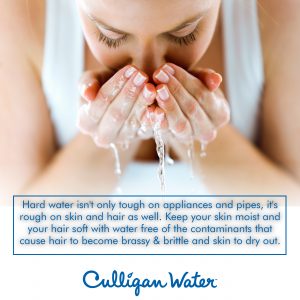Urban Myths: Soft Water And Hair Loss
Most of us probably don’t think too much about how our water, and its quality, impacts our hair. The fact is, however, that whether your water is on the harder end of the spectrum, or the softer, you’ll generally notice some pretty obvious results once you start paying attention.
We’ve also seen our share of myths circulate about soft water hair loss, so it’s time to set the record straight about how your hair reacts to softened water. One of the most common questions we’ve come across is:
Is Your Water Softener Causing Hair Loss?
The short answer is no. Many people may notice a change in their hair if they move from a location with hard water to a location with soft water, however this change is generally unrelated to the amount of hair you have (or whether it’s falling out)— rather it has to do with the quality of your hair. In general, other changes in your environment are likely causing any hair loss, specifically changes to your diet and stress levels. If you’ve begun eating more poorly than you’re used to, or recently experienced a stressful event like moving homes or starting a new job, the hair loss culprit is more likely that than your water quality.
How Your Hair Reacts to Soft Water
 Soft water penetrates the hair shaft more easily than hard water, which means it can most often leave your hair feeling shinier and softer. People can mistake this difference for their hair feeling thinner, and this is what most often contributes to concerns about hair loss when shampooing with soft water. This texture difference also helps soft water hair lie more smoothly, so that can also make hair seem more thin or slightly less voluminous than hair washed in hard water.
Soft water penetrates the hair shaft more easily than hard water, which means it can most often leave your hair feeling shinier and softer. People can mistake this difference for their hair feeling thinner, and this is what most often contributes to concerns about hair loss when shampooing with soft water. This texture difference also helps soft water hair lie more smoothly, so that can also make hair seem more thin or slightly less voluminous than hair washed in hard water.
Your Hair On Hard Water
In contrast, the high mineral count in hard water can aggravate your hair – leaving it brittle and dry. And while this isn’t always the healthiest thing for hair, it can often give the appearance of having more structure or volume. Hard water also has a tendency to make hair appear dull, and minerals like magnesium and calcium typically build up on hair and hair follicles, drying it out and causing splitting and breaking.
Benefits of Hair Washing with Soft Water
 Soft water has long been preferred by hair professionals and beauty experts for a variety of reasons. Most notably, soft water lacks the heavy minerals that can damage hair and make it less resilient to other changes (like stress or diet). Because soft water can penetrate the hair follicle more fully, it generally helps hair look shinier, softer, and less damaged.
Soft water has long been preferred by hair professionals and beauty experts for a variety of reasons. Most notably, soft water lacks the heavy minerals that can damage hair and make it less resilient to other changes (like stress or diet). Because soft water can penetrate the hair follicle more fully, it generally helps hair look shinier, softer, and less damaged.
In addition to being gentler on your hair, soft water lathers more quickly and easily so you don’t need to use as much product as you would with hard water.
Home Hair Loss Remedies and Soft Water
Dissolved minerals and metals in water can make it more difficult for hair to rinse fully, and can leach nutrients from your hair. So whether you’re trying to stop hair loss with herbal or natural remedies, it’s likely you’ll need more of whatever remedy you’ve chosen because hard water will be working against you when it comes time to later, rinse, repeat.
Looking for a way to help your hair stay healthy and look its best? A whole-home water softener provides high quality, soft water at every faucet and tap in your home so you can experience the benefits no matter where you wash. And the benefits don’t stop with your hair – from added skin benefits to other perks like lower utility bills and longer-lasting appliances, a home water softener can make life a little easier all over the home.
